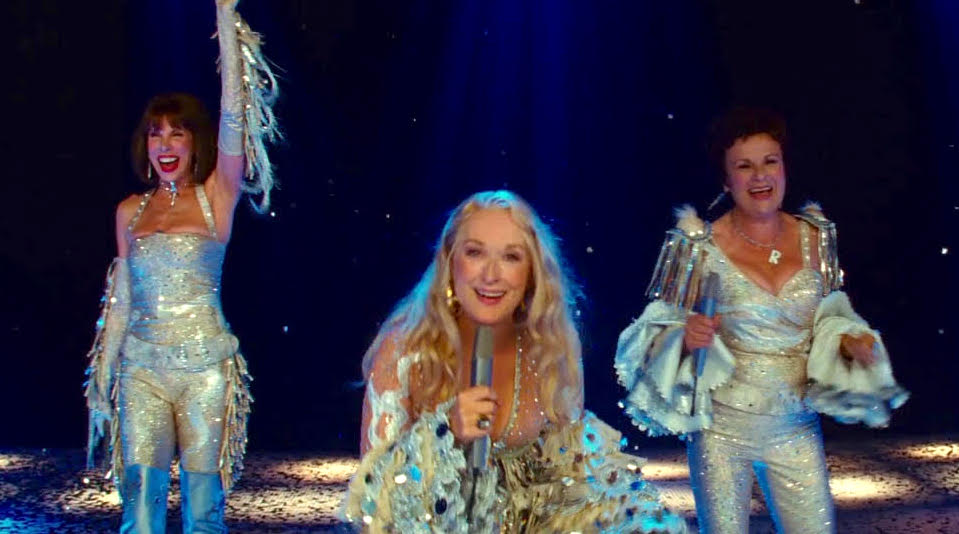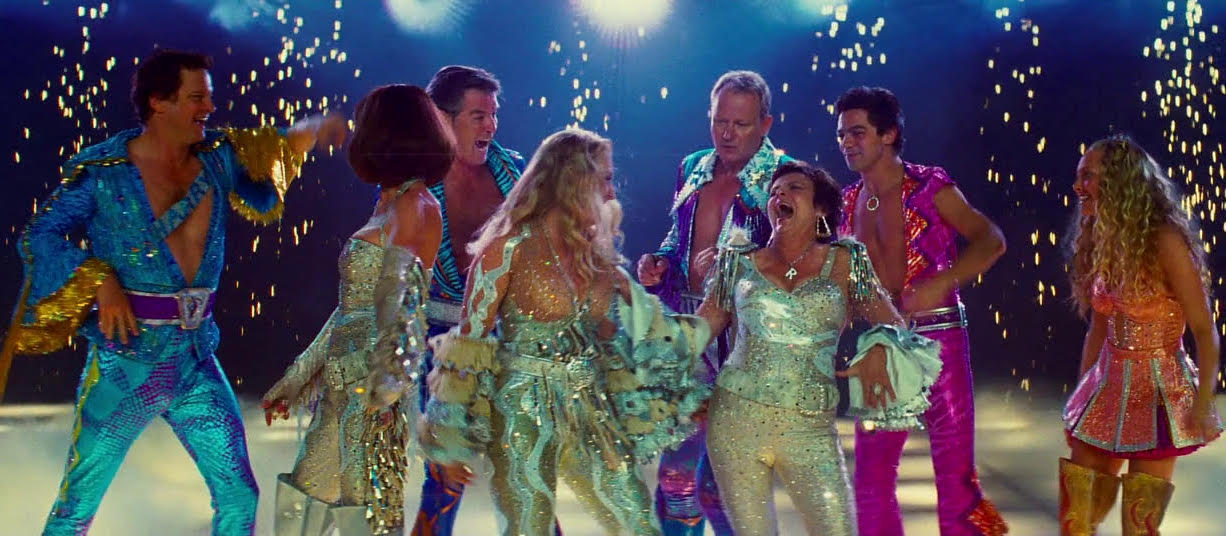John and Matthew are watching every single live-action film starring Meryl Streep.
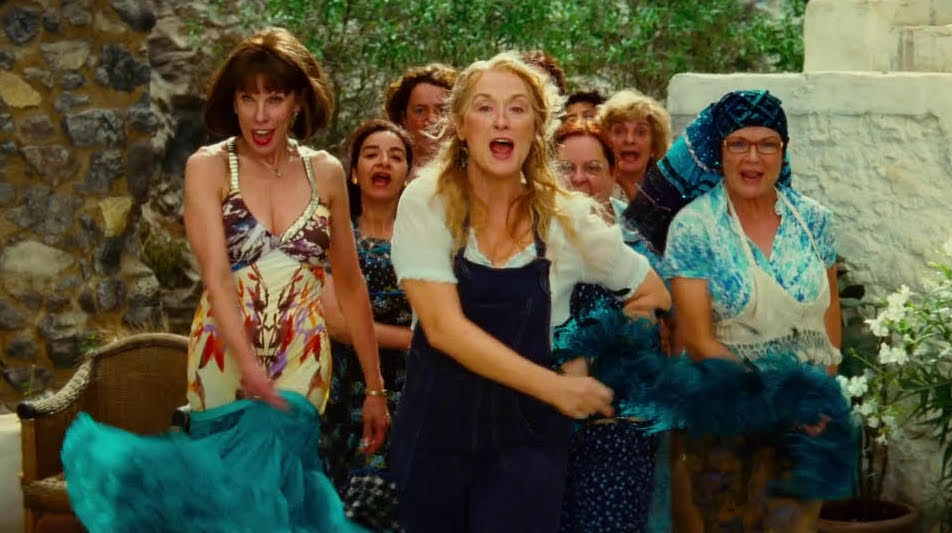
#39 —Donna Sheridan, a dancing queen, hotelier, and single mother of a bride-to-be.
MATTHEW: When it comes to motion picture musicals, the old adage certainly holds true — they really don’t make them like they used to. But when it comes to Mamma Mia!, the 2008 cinematic adaptation of the long-running jukebox stage show/certified cash cow that’s still chugging along on the West End and in numerous cities across the globe, one could justifiably say that they, thankfully, never made them quite like this.
Structured around the music of ABBA, the story is thin but not automatically dire, at least on paper: Sophie Sheridan (Amanda Seyfried) is an unusually deceptive 20-year-old engaged to be married to Sky (Dominic Cooper) and living on the fictitious, picturesque Greek island of Kalokairi, where her mother Donna (Meryl Streep) owns and operates a modest yet crumbling hotel...
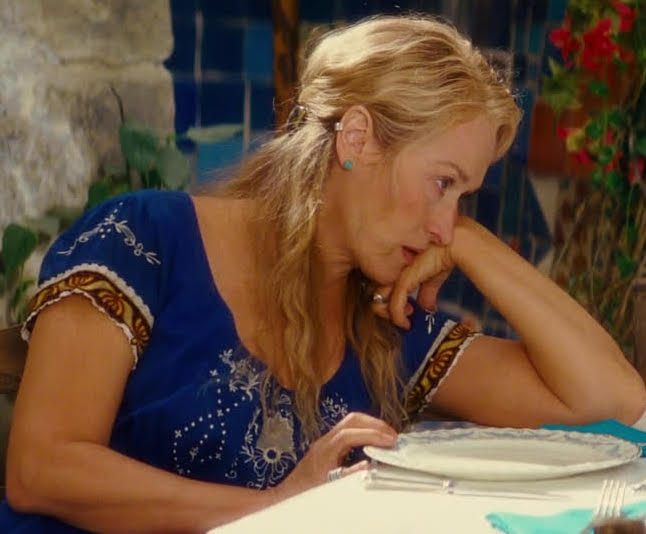 Reared by Donna for her entire life, Sophie has never been made privy to the identity of her birth father, which is just as her headstrong mother prefers it. But Sophie considers this absence a personal lack, which is what compels her to invite three of Donna’s ex-boyfriends (Pierce Brosnan, Colin Firth, and Stellan Skarsgård) to her impending nuptials, in the hopes of finding out which of these men, whom mom dated in quick succession around the time of her conception, is her real dad; their arrival throws the entire celebration into chaos and gives Donna, in particular, a great deal of renewed personal strife.
Reared by Donna for her entire life, Sophie has never been made privy to the identity of her birth father, which is just as her headstrong mother prefers it. But Sophie considers this absence a personal lack, which is what compels her to invite three of Donna’s ex-boyfriends (Pierce Brosnan, Colin Firth, and Stellan Skarsgård) to her impending nuptials, in the hopes of finding out which of these men, whom mom dated in quick succession around the time of her conception, is her real dad; their arrival throws the entire celebration into chaos and gives Donna, in particular, a great deal of renewed personal strife.
Again, the premise of Mamma Mia! doesn’t immediately signal disaster. Sure, screenwriter Catherine Johnson, who also penned the book for the stage production, keeps shoehorning those ABBA songs into her script, no matter their bewildering narrative incongruity. Confectionary divertissements have been made from equally slim material so why should this be any different?
Yet as directed by Phyllida Lloyd, an experienced veteran of the original stage show who has won greatest acclaim for a recent trilogy of all-women Shakespeare revivals, Mamma Mia! becomes one of the final nails in the coffin of a once-glorious film genre. This is, from beginning to end, a merry musical catastrophe that tries to mask its lack of preparation, which is really to say its lack of imagination and basic cinematic craftsmanship, as moment-to-moment spontaneity. The deplorable amateurishness of Lloyd’s filmmaking only grows grimmer as the “plot” thickens, offering nothing more than overqualified actors running through sub-Zumba dance moves and performing throaty karaoke renditions of pop gems in depthless images of beaches and piers that are not so much sun-kissed as sun-blasted. In any given shot, there is at least one actor, dancer, or background villager peering around with bug-eyed stupefaction, as though wondering, “Are we really playing it this way?”
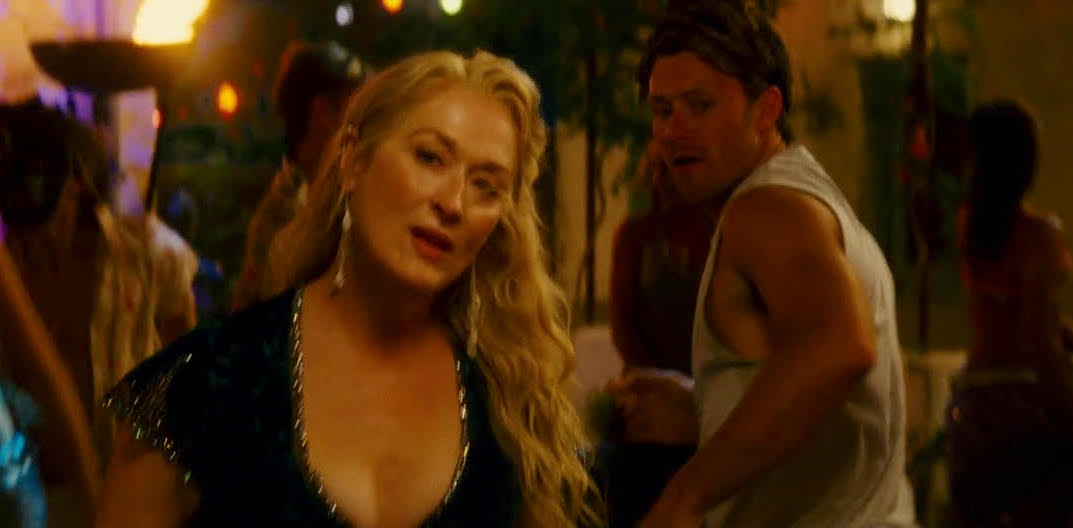
What, then, is Streep doing here, looking utterly ravishing and having nothing short of an out-and-out blast? The actress has spoken before about how taking her children to a matinee of the Broadway production single-handedly revived her spirits in the weeks after September 11th: “We all went out of the theatre floating on the air. I thought, ‘What a gift to New York right now.’” When it came time to turn this commercial juggernaut into a movie, Streep, who had previously sent a “thank you” note to Lloyd and producer Judy Craymer after seeing the production, was an obvious choice for the world-weary but still-kicking songstress Donna. (Streep claims her 2006 Shakespeare in the Park performance in Mother Courage and Her Children, which Craymer attended, sealed the deal — as if Meryl Fucking Streep needed to prove a goddamn thing to the minds behind Mamma Mia!)
But what is it exactly that convinced Streep to loan her virtuosity to this particular project? “It’s a requirement of popular culture that you strike an ironic distance,” she told The Guardian in 2008. “[Mamma Mia!] doesn’t. It’s a film about women and their whole experiences being hopeful and youthful and older and suffering the regrets that you have over a long life. It’s visceral and I love that.”
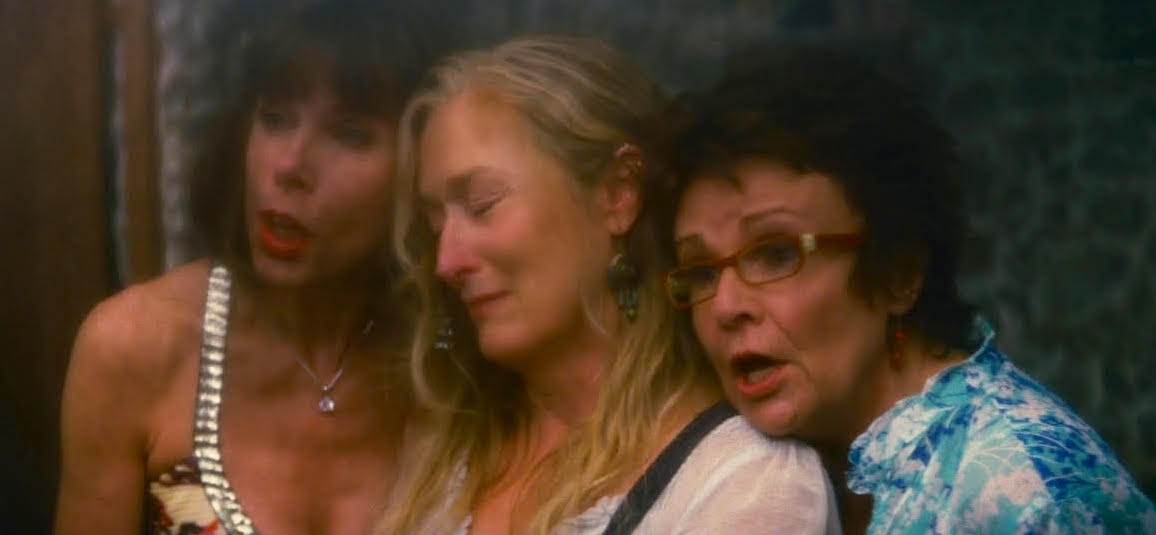
It makes sense that Streep is nothing short of a peppy team player, especially when cackling, screeching, and gesticulating through her scenes with gal pals Julie Walters and Christine Baranski. She also effortlessly counterbalances the painful earnestness of Brosnan, playing Donna’s One That Got Away, with perfectly stone-faced prickliness. On the whole, she fares better with the movie’s comedic components than its musical requirements, as lax and undemanding as they are. (“You have a boat? Good, get on it!” she squawks in one killer rejoinder to Skarsgård upon encountering all three of her long-gone ex-beaus in her villa’s decrepit goat house.) But she still looks like she’s feigning emotions on multiple occasions, not least of all when forced to strike endless poses of lusty pining in the ineptly-staged title song and “S.O.S.” or, later on, waving and lunging in the wind during the kiss-off of “The Winner Takes It All,” a scene under-conceived and under-directed yet again by Lloyd.
If there’s one redeeming element to all of these missteps it’s Streep’s sweet-and-scolding chemistry with Seyfried. This side of the character, the ambivalent but eternally loving mother, is what Streep seems to connect most to, which is perhaps why “Slipping Through My Fingers,” in which Donna prepares Sophie for a wedding she can’t fully support in a truly inspired matching of song to scenario, is the lone scene in the entire movie that rings true.
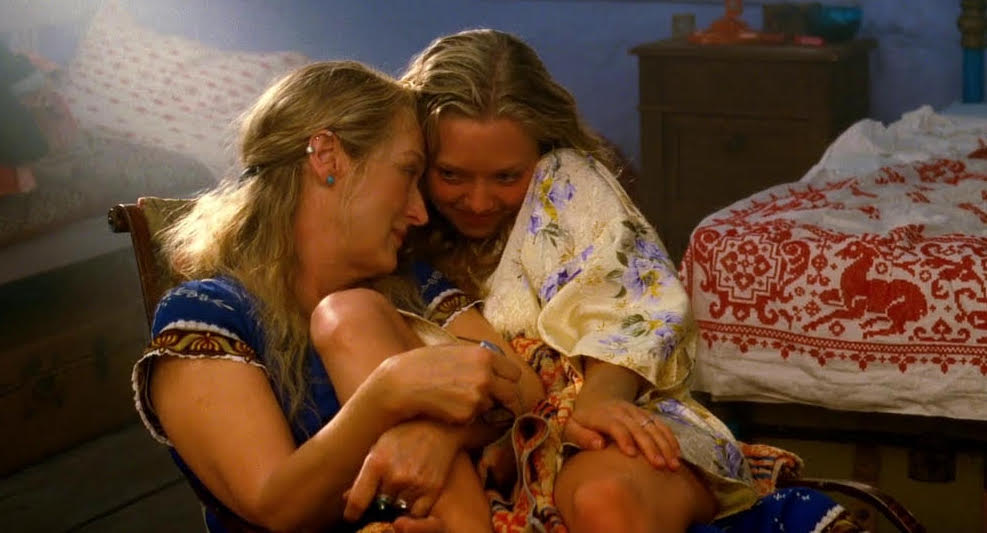
What do you make of Streep’s not entirely satisfying but no less bella Donna? (It should also be noted that this century has yet to produce a more cogent or cutting piece of film criticism than French and Saunders’ gut-busting spoof of Mamma Mia!)
JOHN: I’ve laid all my love on Meryl Streep and now, chiquitita, I’ll tell you the truth: Whatever happened to our love? I wish I understood; it used to be so nice, it used to be so good. I feel compelled, like a criminal on the stand, to inform the jury that I love Meryl Streep, I’ve danced/jived/had the time of my life listening to ABBA’s stellar discography, and, from Meet Me in St. Louis to Dancer in the Dark, I treasure dexterously-made, consummately-performed movie musicals. Nonetheless, Mamma Mia! squanders all of its goodwill as quickly as possible, resulting in a film as jumbled as a game of Mad Libs and as adept as a middle school theater production.
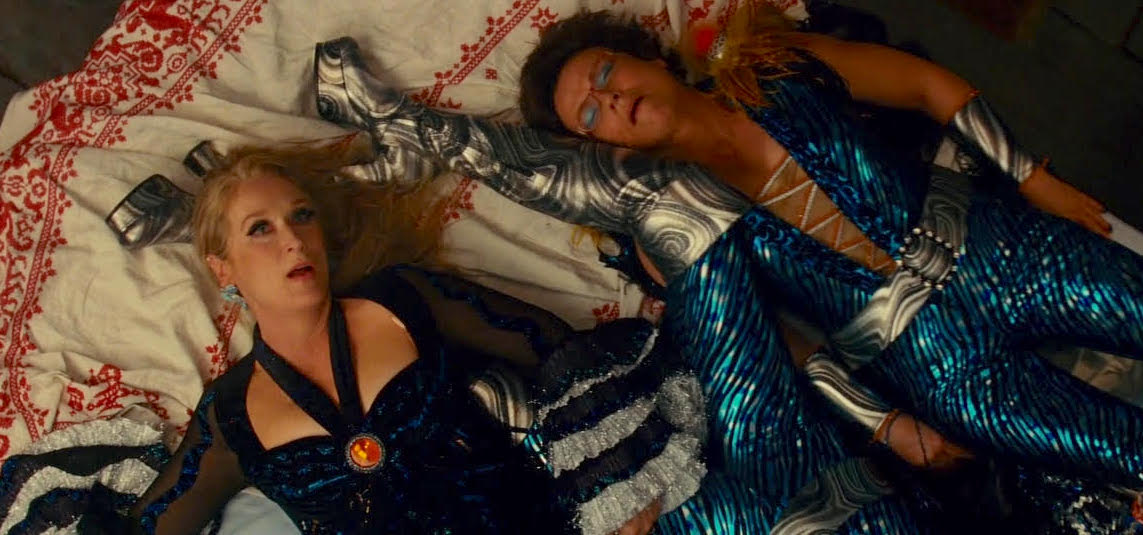
From the moment chipmunk-chipper Amanda Seyfried greets her besties at the dock and lays out her diabolical plan to meet her father, you expect hyperbolic comedy strung together as little more than filler between ABBA’s greatest hits. Okay, fine. But nothing quite prepares you for the sight of such misfires as an adult black man in a diaper, or the constant use of laundry and funky boas as mise-en-scène, or Pierce Brosnan’s haggard renditions, or the truly unspeakable “Lay All Your Love on Me” softcore waterfront fantasia. Phyllida Lloyd blocks actors, Haris Zambaroukos shoots them, and Lesley Walker edits them as if they anticipated audiences would be too sozzled to keep track of spatial, temporal, and emotional logic, chugging along a preposterous story and humanoid characters with a vision, simply, of Fun on a Greek Island! and foreseeing the large paychecks the musical’s popularity would guarantee.
Inserting Streep into your inept film usually results in either two scenarios: she will either go down with the ship and embarrass herself, or she will single-handedly lend the film its entire reason for being. In Mamma Mia!, Streep manages total, almost maniacal, commitment to her godawful material, singing and cavorting with the energy of an adrenalized kindergartener, and yet unsurprisingly affording the film a semblance of emotional truth and artistic legitimacy, steering it away, somehow, from total catastrophe.
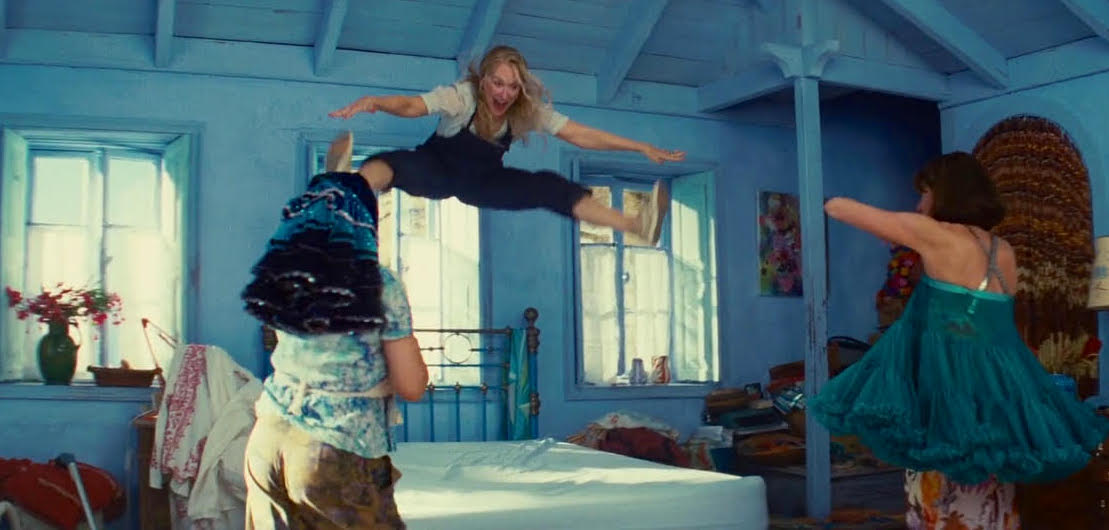
Streep is unmistakably hamming it up to a degree she is rarely permitted, unstewarded in the slightest by anyone behind or in front of the camera. The script’s absurd mechanics often have her playing ten motivations a minute, like in the titular number, in which Streep seems aghast at her ex-lovers’ random appearance in her villa yet also excited, even aroused, to have them back yet also regretful of her own impulses, trying her damndest to characterize what is essentially a scene derived entirely from nondescript lyrics. But through her unflagging exuberance, Streep manages to enliven Donna’s romantic regret and present-day titillation, treating her viewers to an unfiltered burst of personality, sans any depth or form of “character.” And her interpretation of “Slipping Through My Fingers” is a charitable act that briefly rescues her younger co-star’s lunatic performance, and a rare instance of an ABBA song complementing, rather than contorting, a scene.
Mamma Mia! made buckets of money in 2008; its $600 million international haul easily makes it Streep’s highest-grossing movie worldwide. Though I cannot, as Streep claimed, deem Mamma Mia! “visceral,” it is heartening to see a film (partly) about an older woman contemplating her life choices fare this well at the box office. Clearly, this underserved demographic is what drew Streep to the film and further influenced how she shaped the performance: her Donna is a woman reflecting on the loves she has lost amid a period of distressing, late-age change. It is encouraging to watch Streep, at age 59, enter her 60s with a newfound sense of unabashed pleasure and purpose, even if the films themselves frequently have us sending out an S.O.S.
